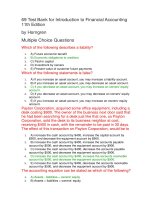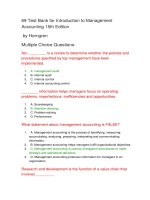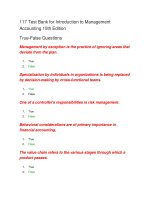Test bank for introduction to organic chemistry 4th edition by brown
Bạn đang xem bản rút gọn của tài liệu. Xem và tải ngay bản đầy đủ của tài liệu tại đây (75.23 KB, 17 trang )
Chapter 1 - Covalent Bonding and Shapes of Molecules
Multiple Choice
Section 1.1
Difficulty Level: Easy
1. Which is the electronic configuration that describes Mg2+?
a) 1s2, 2s2
b) 1s2, 2s2, 2p6
c) 1s2, 2s2, 2p6, 3s2
d) 1s2, 2s2, 2p6, 3s2, 3p6
Section 1.1
Difficulty Level: Easy
2. Which is the electronic configuration that describes C?
a) 1s2, 2s2, 2p5
b) 1s2, 2s2, 2p6, 3s2
c) 1s2, 2s2, 2p2
d) 1s2, 2s2, 2p6
Section 1.1
Difficulty Level: Easy
3. Which ion is described by the electronic configuration 1s22s22p63s23p2?
a) Mg+
b) Al+
c) Si+
d) P+
Section 1.1
Difficulty Level: Easy
4. Which atom is described by the electron configuration 1s22s22p63s23p5?
a) S
b) Se
c) Cl
d) Br
Section 1.1
Difficulty Level: Easy
5. Carbon has how many valence electrons?
a) 2
b) 4
c) 6
d) 8
1
Chapter 1 - Covalent Bonding and Shapes of Molecules
Section 1.1
Difficulty Level: Easy
6. Oxygen has how many valence electrons?
a) 4
b) 5
c) 6
d) 7
Section 1.1
Difficulty Level: Easy
7. Nitrogen has how many valence electrons?
a) 4
b) 5
c) 6
d) 7
Section 1.1
Difficulty Level: Medium
8. Which statement about orbitals is false?
a) Orbitals are regions of space where electrons are found.
b) Orbitals may contain up to two electrons.
c) Orbitals are filled in order of decreasing energy.
d) Orbitals of equivalent energy are half filled before adding two electrons to any one of them.
Section 1.2
Difficulty Level: Easy
9. Which atom is described by the Lewis structure
A ?
a) C
b) P
c) Se
d) I
Section 1.2
Difficulty Level: Easy
10. Which atom is described by the Lewis structure
A ?
a) C
b) P
c) Se
d) I
2
Chapter 1 - Covalent Bonding and Shapes of Molecules
Section 1.2
Difficulty Level: Medium
11. Which Lewis structure is correct?
HINT: Count the electrons around each center in step 1 and check, whether the charges (or the absence of
them) is correct in step 2.
a) a
b) b
c) c
d) d
Section 1.2
Difficulty Level: Medium
12. Which Lewis structures are correct?
HINT: Count the electrons around each center in step 1 and check, whether the charges (or the absence of
them) is correct in step 2.
H O O H
I
H
H N N H
H N O
II
a)
b)
c)
d)
H
H H
H
H
III
IV
I, II
II, IV
III, IV
I, III
Section 1.2
Difficulty Level: Medium
13. Which functional groups have correct Lewis structures?
O
C O H
C O
hydroxyl
I
carbonyl
II
C O H
carboxyl
III
a) I, II
b) II, III
c) I, II, III
d) I, III
3
H C
Cl
Chapter 1 - Covalent Bonding and Shapes of Molecules
Section 1.2
Difficulty Level: Hard
14. Which is the correct Lewis structure for acetic acid (CH3CO2H)?
H O
H O
H C
C O
H
H C C O
H H
O H
H C O C H
H H
a)
O
H O C
H
b)
C H
H
c)
d)
a) a
b) b
c) c
d) d
Section 1.3
Difficulty Level: Medium
15. Using the VSEPR model, predict which atoms have bond angles of about 120°.
O
C
CH3
H
CH3OH
I
II
CH2
CH2
III
NH4Cl
IV
a) II, IV
b) I, IV
c) II, III
d) I, III
Section 1.3
Difficulty Level: Medium
16. Using the VSEPR model, predict which species have bond angles of about 109°.
HINT: Assume that the charges are correct. Add the missing lone pairs before applying the VSEPR theory!
NH3
CO2
H2O
H3O
I
II
III
IV
a) I, III, IV
b) II, III, V
c) I, IV
d) III, IV, V
4
+
O3
V
Chapter 1 - Covalent Bonding and Shapes of Molecules
Section 1.3
Difficulty Level: Medium
17: Which of the atoms that are marked with an arrow have tetrahedral geometry?
O
CH3
O
OH
C
CH3
C
H
CH3
I
a)
b)
c)
d)
H
II
N
C
CH3
CH3
III
O
CH3
CH3
IV
OH
V
I, II
II, IV
I, IV, V
II, II, V
Section 1.3
Difficulty Level: Medium
18: Which of the atoms that are marked with an arrow are sp2-hybridized?
O
H3C
O
OH
C
CH3
H
C
H
I
CH3
II
CH3
III
N
CH3
O
CH3
C
CH3
IV
V
a) I, II, III
b) I, II, IV
c) I, III, V
d) III, IV
Section 1.3
Difficulty Level: Hard
-
19. According to VSEPR model, what is your prediction for the arrangement of electron pairs for CH3 ?
a) linear
b) tetrahedral
c) bent
d) trigonal
5
OH
Chapter 1 - Covalent Bonding and Shapes of Molecules
Section 1.4
Difficulty Level: Easy
20. Arrange the bonds in increasing order of ionic character (least first).
C-C
I
Na-O
II
C-N
III
O-H
IV
C-O
V
a) III, I, IV, II, V
b) V, III, I, II, IV
c) I, V, III, IV, II
d) I, III, V, IV, II
Section 1.4
Difficulty Level: Easy
21. Nitrogen has a negative formal charge in which of the following compounds?
a) NaNH2
b) N2
c) NH4Cl
d) HCN
Section 1.4
Difficulty Level: Easy
22. What is the formal charge of oxygen in H3O+?
a) –1
b) 0
c) +1
d) +2
Section 1.4
Difficulty Level: Medium
23. Which compounds contain both covalent and ionic bonds?
CH3OH
I
Na2CO3
II
NH4Cl
III
NaCl
IV
a) I, II
b) II, IV
c) I, II, IV
d) II, III
Section 1.4
Difficulty Level: Medium
24. Which of these molecules are polar?
HINT: look for the presence of at least one polar covalent bond in these molecules!
NH3
CO2
H2O
I
II
III
a)
b)
c)
d)
I, IV
I, III
II, III, IV
III, IV, V
6
CH4
Br2
IV
V
Chapter 1 - Covalent Bonding and Shapes of Molecules
Section 1.4
Difficulty Level: Medium
25. Which of these molecules are polar?
HINT: look for the presence of at least one polar covalent bond in these molecules!
O
CH2
CH2
I
C
H
CH2Cl2
H
II
CH3
CH3
IV
III
CH3OH
V
a) III, IV, V
b) I, IV
c) II, III, V
d) I, III
Section 1.4
Difficulty Level: Medium
26. What is the formal charge of indicated carbon in the following molecule? (HINT: determine the charge first).
O
CH2
C
H
a) –2
b) –1
c) 0
d) +1
Section 1.4
Difficulty Level: Hard
27. Using the VSEPR model, predict which molecules have bond angles of about 109°.
HINT: it is sufficient to discern one atom center in a molecule that has four bonds & lone pairs attached to it.
F
CH2
CH2
I
CH2
O
II
CH3
N
C
III
a) II, IV
b) I, II, III
c) III, IV, V
d) II, III, ,IV
7
O
Cl
C
CH3
F
HO
C
Cl
CH3
IV
V
CH3
Chapter 1 - Covalent Bonding and Shapes of Molecules
Section 1.4
Difficulty Level: Hard
28. Using the VSEPR model, predict which molecules have bond angles of about 120°.
HINT: it is sufficient to discern one atom center in a molecule that has three bonds & lone pairs attached to
it.
F
CH2
CH2
CH2
I
O
II
CH3
N
C
Cl
O
III
C
CH3
F
CH3
IV
V
Section 1.5
Difficulty Level: Medium
29. Which statement about contributing structures is false?
a) All contributing structures must have the same number of valence electrons.
b) All contributing structures must obey the rules of covalent bonding.
c) The position of nuclei may change.
d) Third period atoms may have up to 12 electrons around them.
30. Which of the following are pairs of contributing structures?
I
O
CH3
CH3
II
CH2
III
CH2 CH
IV
N
CH3
CH2
CH2
O
CH2
C
OH
O
CH2 CH CH2
N
O
a) II, IV
b) I, II, III
c) III, IV
d) II, III, ,IV
8
C
O
C
Cl
a) I, II, IV
b) I, II, III
c) III, IV, V
d) II, III, ,IV
Section 1.5
Difficulty Level: Hard
HO
CH3
Chapter 1 - Covalent Bonding and Shapes of Molecules
Section 1.6
Difficulty Level: Medium
31. The carbon has the correct orbital hybridization in which structures?
CH2
O
CH2
CH2
sp2
sp
I
II
CH4
CH
sp2
sp
III
N
O
C
O
sp
IV
V
a) II, IV, V
b) II, III, IV
c) I, II, III
d) I, IV, V
Section 1.6
Difficulty Level: Medium
32. What are the correct orbital hybridizations for carbon in the following species?
HINT: Add a lone pair if the charge of the molecule suggests it!
A. CH3
I. sp
B. CH4
II. sp
C. CH
3
III. sp
2
3
a) A and I, B and III
b) B and I, C and II
c) A and III, C and II
d) A and III, B and III
Section 1.7
Difficulty Level: Easy
33. Which of the following compounds is a tertiary (3°) alcohol?
CH3
CH3
CH OH
CH3
C
CH3
CH3
I
II
CH3
OH
CH3
OH
C
CH2
CH3
CH3
CH CH
CH3
III
a) I
b) II
c) III
d) IV
9
OH
CH3
IV
Chapter 1 - Covalent Bonding and Shapes of Molecules
Section 1.7
Difficulty Level: Medium
34. Which compounds are classified correctly?
HINT: Assume that the charges are correct. Add the missing lone pairs!
O
O
C
CH3
H
CH3
OH
H
C
CH3
CH3
N
CH3
alcohol
aldehyde
ketone
amine
I
II
III
IV
O
CH3
C
CH3
OH
carboxylic acid
V
a) III, IV, V
b) II, III, IV
c) I, III, V
d) I, III, IV
Section 1.7
Difficulty Level: Medium
35. Which of the three molecules testosterone, methadone and hydrocodone contains a ketone?
testosterone
methadone
N
OH
O
H
H
hydrocodone
N
H
O
O
I
II
O
III
a) I,II
b) III
c) II,III
d) I, II, III
10
O
Chapter 1 - Covalent Bonding and Shapes of Molecules
Section 1.7
Difficulty Level: Medium
36. Which of the three molecules testosterone, methadone and hydrocodone contains an amine?
testosterone
methadone
N
OH
O
H
H
hydrocodone
N
H
O
O
I
II
O
O
III
a) I,II
b) III
c) II,III
d) I, II, III
Section 1.7
Difficulty Level: Medium
37. Which of the three molecules testosterone, methadone and hydrocodone contains a hydroxyl group.
testosterone
methadone
N
OH
O
H
H
hydrocodone
N
H
O
O
I
II
O
III
a) I
b) I, III
c) II,III
d) I, II, III
11
O
Chapter 1 - Covalent Bonding and Shapes of Molecules
Section 1.7
Difficulty Level: Medium
38. Which of the three molecules aspirin, paracetamol and ibuprofen contains a carboxyl group?
aspirin
paracetamol
ibuprofen
O
OH
O
O
HO
O
O
N
H
OH
I
II
III
a) I
b) I, III
c) II,III
d) I, II, III
Section 1.7
Difficulty Level: Hard
39. What is the correct structure for the aldehyde, which has the formula C4H8O?
HINT: Assume that the charges are correct. Add the missing lone pairs!
O
OH
CH3
CH
CH CH2
CH3
C CH2 CH3
II
I
O
CH3 CH2 CH2 CH
III
CH2 CH
IV
a) I
b) II
c) III
d) IV
12
CH2 O
CH3
Chapter 1 - Covalent Bonding and Shapes of Molecules
Fill in the Blank Questions
Section 1.1
Difficulty Level: Easy
1. The spins of the electrons must be _______ in an orbital.
Section 1.1
Difficulty Level: Easy
2. Outer shell electrons are called _________ electrons.
Section 1.1
Difficulty Level: Easy
3. ______ is the number of valence electrons for S.
Section 1.1
Difficulty Level: Easy
4. ______ is the number of valence electrons for Br.
Section 1.1
Difficulty Level: Easy
5. The tendency of an element to react such that it achieves a noble gas configuration is called
the ______ ______. (Sec. 1.1, EASY)
Section 1.4
Difficulty Level: Medium
6. The most polar bond in the following molecule is __________.
H OH H
F C C C NH2
H H H
Section 1.4
Difficulty Level: Medium
7. A __________ bond is characterized by the unequal sharing of electrons.
Section 1.7
Difficulty Level: Medium
8. The following molecule contains the _________ and __________ functional groups.
O
OH
13
Chapter 1 - Covalent Bonding and Shapes of Molecules
Section 1.7
Difficulty Level: Medium
9. The following molecule contains the _________ and __________ functional groups.
NH2
OH
O
Section 1.7
Difficulty Level: Medium
10. Functional groups undergo the same type of __________ in whatever compound they are found.
Section 1.7
Difficulty Level: Medium
11. ______________ are the basis for compound nomenclature.
True-False Questions
Section 1.1
Difficulty Level: Easy
1. Each shell can hold two electrons.
Section 1.1
Difficulty Level: Medium
2. Orbitals make up the majority of the mass of an atom.
Section 1.2
Difficulty Level: Easy
3. An atom that gains electrons is called an anion.
Section 1.2
Difficulty Level: Easy
4. Ionic bonds are characterized by the unequal sharing of electrons.
Section 1.2
Difficulty Level: Medium
5. The group 7A elements react by losing an electron to achieve a noble gas configuration.
Section 1.2
Difficulty Level: Medium
6. The group 2A elements react by losing two electrons to achieve a noble gas configuration.
Section 1.2
Difficulty Level: Medium
7. Carbon reacts by gaining 4 electrons to achieve a noble gas configuration.
14
Chapter 1 - Covalent Bonding and Shapes of Molecules
Section 1.4
Difficulty Level: Medium
8.
CH3CH2CH2CH2CH2OH
is a polar molecule.
Section 1.4
Difficulty Level: Medium
9.
CH3ONa
contains only polar covalent bonds.
Section 1.7
Difficulty Level: Medium
10. The following molecule is an example of a secondary amine.
CH3
HC NH2
CH3
15
Chapter 1 - Covalent Bonding and Shapes of Molecules
Answers
Multiple Choice
1. b
2. c
3. d
4. c
5. b
6. c
7. b
8. c
9. c
10. a
11. a,d
12. c
13. d
14. d
15. d
16. a
17. b
18. c
19. b
20. d
21. a
22. c
23. d
24. b
25. c
26. b
27. c
28. b
29. c
30. c
31. a
32. c,d
33. b
34. a
35. d
36. c
37. a
38. b
39. c
Fill in the Blank Questions
1. paired
2. valence
3. 6
4. 7
5. octet rule
6. C-F
7. polar covalent
8. hydroxyl and carboxyl groups
9. 1° amino and carboxyl groups
10. reactions
16
Chapter 1 - Covalent Bonding and Shapes of Molecules
11. Functional groups
True-False Questions
1. F
2. F
3. T
4. F
5. F
6. T
7. F
8. T
9. F
10. F
17









